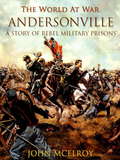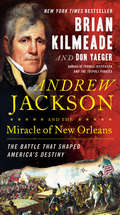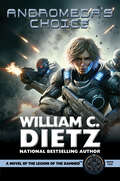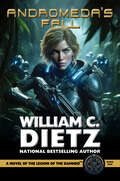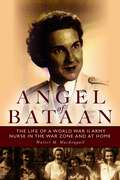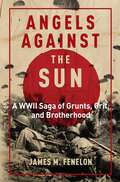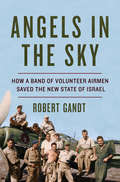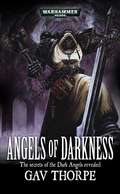- Table View
- List View
Andersonville A Story of Rebel Military Prisons (The World At War)
by John McElroyThis is the story of Andersonville. Considered one of the most horrific prisons in the Civil War
Andersonville: The Last Depot
by William MarvelWilliam Marvel provides a history of Andersonville Prison and conditions within it based on diaries, Union and Confederate government documents, and letters.
Andrew Britton Bundle: The American, The Assassin,The Invisible, The Exile (A Ryan Kealey Thriller)
by Andrew BrittonThe American CIA agent Ryan Kealey has no time to wrestle his demons. Former U.S. soldier Jason March, one of the world's deadliest assassins and Ryan's former protégé, is now working with a powerful terror network whose goal is nothing less than the total annihilation of the United States. Ryan puts together the pieces of a terrifying puzzle. With the fate of the country resting on his shoulders, he finds himself caught in a desperate game of cat-and-mouse with the most cunning opponent he's ever faced, a man who won't be denied the ultimate act of evil and who is all the more deadly for being one of our own. The Assassin A weapon of catastrophic destruction. A nation on the brink of unspeakable disaster. And the ultimate enemy lies closer to home than anyone realizes. Only maverick CIA agent Ryan Kealey sees the threat for what it really is--but Washington refused to listen. With the lives of millions at stake, Kealey has only one option: to take matters into his own hands. And the clock is ticking. . . Supercharged and fiercely intelligent, The Assassin is an action-packed international thriller where no one can be trusted--and the final aftershocks are felt until the very last page. The Invisible Tensions between Pakistan and India are at an all-time high. To complicate matters, twelve American climbers have disappeared in Pakistan's Hindu Kush range. As the conflict escalates, the U.S. Secretary of State's motorcade is ambushed on the outskirts of Islamabad. When her back-up team arrives, they discover a disastrous scene: dozens are dead, including seven diplomatic security agents, and the secretary of state has vanished without a trace. In the wake of the unprecedented attack, CIA agent Ryan Kealey's operation goes into high gear. Naomi Kharmai, the British-born analyst who has taken on a daring new role with the Agency, is on his team again. But Kharmai is becoming increasingly unpredictable, and as they work their way toward the target, it becomes clear to Kealey that anyone is fair game--and no one can be trusted. Thundering to a stark and chilling climax, The Invisible raises the stakes on every page. A crackingly intelligent thriller, it is filled with shocking betrayal and, ultimately, revenge. The Exile For the President of the United States, the daily horror of life in West Darfur's killing fields just hit heartbreakingly close to home. His niece, Lily, has been targeted and savagely murdered by a corps of fearsome government-backed militiamen. With the situation too explosive for diplomatic or military solutions, yet with the President and the public thirsting for revenge, America is out of options. Except one: Ryan Kealey, ex-Special Forces, former CIA, and unrivaled counterterrorism expert. Kealey has been central to the war on terror for over a decade. But after the Agency hung him out to dry--and let his lover die--he turned his back. Until now. For the government has revealed its trump card, the one thing Kealey will risk everything for. Soon, from the lawless streets of Sudan to the highest levels of the American government, Kealey unearths secrets and betrayals that shock even his war-tempered sensibilities--and ignite a conflagration with unknowable global consequences.
Andrew Jackson and the Miracle of New Orleans: The Battle That Shaped America's Destiny
by Brian Kilmeade Don Yaeger<P>Another history pageturner from the authors of the #1 bestsellers George Washington's Secret Six and Thomas Jefferson and the Tripoli Pirates. <P>The War of 1812 saw America threatened on every side. Encouraged by the British, Indian tribes attacked settlers in the West, while the Royal Navy terrorized the coasts. By mid-1814, President James Madison’s generals had lost control of the war in the North, losing battles in Canada. Then British troops set the White House ablaze, and a feeling of hopelessness spread across the country. <P>Into this dire situation stepped Major General Andrew Jackson. A native of Tennessee who had witnessed the horrors of the Revolutionary War and Indian attacks, he was glad America had finally decided to confront repeated British aggression. But he feared that President Madison’s men were overlooking the most important target of all: New Orleans. <P>If the British conquered New Orleans, they would control the mouth of the Mississippi River, cutting Americans off from that essential trade route and threatening the previous decade’s Louisiana Purchase. The new nation’s dreams of western expansion would be crushed before they really got off the ground. <P>So Jackson had to convince President Madison and his War Department to take him seriously, even though he wasn’t one of the Virginians and New Englanders who dominated the government. He had to assemble a coalition of frontier militiamen, French-speaking Louisianans, Cherokee and Choctaw Indians, freed slaves, and even some pirates. And he had to defeat the most powerful military force in the world—in the confusing terrain of the Louisiana bayous. <P>In short, Jackson needed a miracle. The local Ursuline nuns set to work praying for his outnumbered troops. And so the Americans, driven by patriotism and protected by prayer, began the battle that would shape our young nation’s destiny.As they did in their two previous bestsellers, Kilmeade and Yaeger make history come alive with a riveting true story that will keep you turning the pages. You’ll finish with a new understanding of one of our greatest generals and a renewed appreciation for the brave men who fought so that America could one day stretch “from sea to shining sea.” <P><b>A New York Times Bestseller</b>
Andromeda's Choice: A Novel of the Legion of the Damned (Legion of the Damned: Before the Fall #2)
by William C. DietzAndromeda McKee rebuilt her life in the violent embrace of the Legion of the Damned in the days when cyborgs were first being introduced. Now she must choose between her conscience and her desire for vengeance...In a different world, Lady Catherine “Cat” Carletto would never have left her pampered life behind. But when Princess Ophelia became Empress Ophelia in a coup that claimed the lives of the princess’ brother and all who supported him, including the Carletto family, Cat had to hide—or die.She became Legionnaire Andromeda McKee, and now she’s a battle-scarred veteran who knows how to kill. Summoned to Earth to receive the Imperial Order of Merit from the empress herself, Andromeda learns that she isn’t the sole surviving Carletto—her uncle Rex is not only still alive but also the leader of a resistance group determined to overthrow Ophelia.Caught up in a web of intrigue, Andromeda realizes that the moment is coming when her revenge will be at hand. But will she be able to act, or will she be betrayed by those she has come to trust?
Andromeda's Fall: A Novel of the Legion of the Damned (Legion of the Damned: Before the Fall #1)
by William C. Dietz“Andromeda’s Fall is one of the most interesting futuristic novels.”—SF SiteHundreds of years in the future, much has changed. Advances in medicine, technology, and science abound. Humanity has gone to the stars, found alien life, and established an empire.But some things never change...All her life, Lady Catherine Carletto (called Cat) has lived for nothing but the next party, the next lover, the next expensive toy. Until, in a bloodthirsty power grab, Imperial Princess Ophelia and her cadre of synth assassins murder her brother the emperor, and go on to purge the galaxy of his friends and supporters—including Cat’s family. The Carlettos are known to be staunch supporters of the emperor and Carletto Industries has been in the forefront of his pet project—developing cybernetic technology for use by the masses.Now Cat, one of the last surviving Carlettos, is on the run. And, like countless others before her, she finds her sanctuary among the most dangerous of society’s misfits.Welcome to the Legion.Cat Carletto vanishes, and in her place stands Legion recruit Andromeda McKee. A woman with a mission—to bring down Empress Ophelia—or die trying.
Andromeda's War: A Novel of the Legion of the Damned (Legion of the Damned: Before the Fall #3)
by William C. DietzIn Andromeda’s War, Dietz’ heroine will face her ultimate test—as a battle-scarred legionnaire and as an innocent young woman who once lost everything...Now a platoon leader, Legionnaire Andromeda McKee seems to have successfully left behind her true identity of Lady Catherine “Cat” Carletto, one of the last two surviving members of the Carletto family targeted for death by Empress Ophelia.After failing at her one shot at vengeance, Andromeda had been questioning her own resolve. But now her uncle has been killed in a government raid back on Earth, leaving her as the last Carletto standing—and the family’s only chance for justice...A chance that comes when the empress’ ship crashes on a hostile planet and Andromeda is assigned to head up the rescue mission.As a legionnaire, Andromeda McKee has countless kills under her belt. But when faced with her greatest enemy, it will be Cat Carletto who has to pull the trigger on the one who really matters...
Anecdotes from a Diplomat's Life
by P. J. Rao"A gentle self-deprecating humour pervades his writing ... I express the hope that all the readers of this charming book will enjoy reading it as much as I myself have done." -A.P. Venkateswaran (Former Foreign Secretary) Government of India
Angel Down (Heart On The Run Ser. #1)
by Lois GreimanA thrilling, sensual novel of romantic suspense from USA Today bestselling author, Lois Greiman.Gabriel Durrand's wingman, ex Army Ranger Linus Shepherd, has failed to return from a covert mission in the sweltering jungles of Colombia. Gabe is determined to make certain no man is left behind. Not on his watch. Recouping from an injury himself, he knows he can't bring Shep home alone and seeks an interpreter.When an unknown named Eddy Edwards is recommended for the assignment, Gabe hopes to meet him at Edwards’ neighborhood bar. Hours later, thinking this Eddy is a no-show, Gabe flirts with a girl-next-door beauty. Sparks fly, but during the ensuing romantic interlude, he realizes she’s heavily armed, deadly dangerous, and probably an enemy operative. Jennifer ‘Eddy’ Edwards has been on desk duty at the CIA for far too long and is ready to get her hands dirty, but when she meets sexy Gabriel Durrand at her local hangout, wires get crossed, hormones sizzle, and a battle erupts.Will this unlikely team save Shepherd or will they kill each other before ever arriving in South America?''Greiman's writing is warm, witty, and gently wise.” –Betina Krahn, New York Times bestselling author''Lois Greiman delivers.'' –Christina Dodd, New York Times bestselling author"Lois Greiman is a natural storyteller." –#1 New York Times bestseller, Victoria Alexander “If you enjoy Susan Wiggs and Kristin Hannah, you'll love Greiman's stories of redemption and renewal.”— New York Times bestselling author Kathleen Eagle
Angel Down: A Novel
by Daniel KrausThe critically acclaimed author of the &“crazily enjoyable&” (The New York Times) Whalefall returns with an immersive, cinematic novel about five World War I soldiers who stumble upon a fallen angel that could hold the key to ending the war.Private Cyril Bagger has managed to survive the unspeakable horrors of the Great War through his wits and deception, swindling fellow soldiers at every opportunity. But his survival instincts are put to the ultimate test when he and four other grunts are given a deadly mission: venture into the perilous No Man&’s Land to euthanize a wounded comrade. What they find amid the ruined battlefield, however, is not a man in need of mercy but a fallen angel, seemingly struck down by artillery fire. This celestial being may hold the key to ending the brutal conflict, but only if the soldiers can suppress their individual desires and work together. As jealousy, greed, and paranoia take hold, the group is torn apart by their inner demons, threatening to turn their angelic encounter into a descent into hell. Angel Down plunges you into the heart of World War I and weaves a polyphonic tale of survival, supernatural wonder, and moral conflict.
Angel in the Whirlwind: The Triumph of the American Revolution
by Benson BobrickAngel in the Whirlwind is a dramatic narrative of the American Revolution illuminated by fresh insight by noted historian Benson Bobrick.
Angel of Bataan: The Life of a World War II Army Nurse in the War Zone and at Home
by Walter MacdougallAlice Zwicker was the only service woman from Maine to be a prisoner of the enemy in either of the two World Wars. But there is more to the story than that. Across the nation, wherever one of the seventy-seven Angels of Bataan returned home, there was a hero&’s welcome. Those Army and Navy nurses had shown what American women could do and be, even in times of defeat. This is Alice&’s story: her growing up in a small Maine town, her commitment to the profession of nursing, and her immersion in World War II. There was Manila, Bataan, Corregidor, and then three long, hungry years when she was held prisoner by the Japanese. For Alice, the terrible legacy of war did not end with her liberation from internment camp, or even with her coming home. When victory finally arrived for Alice, it was achieved in her own soul.
Angel of Brooklyn
by Janette JenkinsIt is January, 1914 and Jonathan Crane returns home from his travels with a new American bride, former Coney Island showgirl Beatrice. In the remote Lancashire village Beatrice is the focus of attention, the men captivated by her beauty, the women initially charmed by tales of her upbringing in Normal, Illinois with her father, an amateur taxidermist, and her brother, a preacher, although she will take the story of how she became the Angel of Brooklyn to her grave. But when the men head off to fight in the Great War the glamorous newcomer slowly becomes an object of suspicion and jealousy for the women who are left behind and as the years pass, and their resentment grows, Beatrice's secret proves to be her undoing.Beautifully observed, tragic, funny and so evocative that you can taste the candy floss at Coney Island and feel the chill of wartime England, Angel of Brooklyn is an extraordinary, heartbreaking story.
Angel of Oblivion
by Maja Haderlap Tess LewisHaderlap is an accomplished poet, and that lyricism leaves clear traces on this ravishing debut, which won the prestigious Bachmann Prize in 2011. The descriptions are sensual, and the unusual similes and metaphors occasionally change perspective unexpectedly. Angel of Oblivion deals with harrowing subjects - murder, torture, persecution and discrimination of an ethnic minority - in intricate and lyrical prose.The novel tells the story of a family from the Slovenian minority in Austria. The first-person narrator starts off with her childhood memories of rural life, in a community anchored in the past. Yet behind this rural idyll, an unresolved conflict is smouldering. At first, the child wonders about the border to Yugoslavia, which runs not far away from her home. Then gradually the stories that the adults tell at every opportunity start to make sense. All the locals are scarred by the war. Her grandfather, we find out, was a partisan fighting the Nazis from forest hideouts. Her grandmother was arrested and survived Ravensbrück.As the narrator grows older, she finds out more. Through conversations at family gatherings and long nights talking to her grandmother, she learns that her father was arrested by the Austrian police and tortured - at the age of ten - to extract information on the whereabouts of his father. Her grandmother lost her foster-daughter and many friends and relatives in Ravensbrück and only escaped the gas chamber by hiding inside the camp itself. The narrator begins to notice the frequent suicides and violent deaths in her home region, and she develops an eye for how the Slovenians are treated by the majority of German-speaking Austrians. As an adult, the narrator becomes politicised and openly criticises the way in which Austria deals with the war and its own Nazi past. In the closing section, she visits Ravensbrück and finds it strangely lifeless - realising that her personal memories of her grandmother are stronger.Illuminating an almost forgotten chapter of European history and the European present, the book deals with family dynamics scarred by war and torture - a dominant grandmother, a long-suffering mother, a violent father who loves his children but is impossible to live with. And interwoven with this is compelling reflection on storytelling: the narrator hoping to rid herself of the emotional burden of her past and to tell stories on behalf of those who cannot.From the Trade Paperback edition.
Angel of the North
by Annie WilkinsonWho can she turn to when life gets tough? April 1941, Hull. Nurse Marie Larsen has grown used to the challenges of keeping Hull Royal Infirmary running during the Germans' attacks on her city. Amidst the sudden power cuts, blown out windows and with wounded civilians pouring into the hospital at each new attack, she always thanks her lucky stars that the latest bomb didn't have her name on it. But when a fresh wave of bombings tears Hull apart, this time tragedy strikes close to home. With her mother now critically ill in hospital, and her father missing, Marie will have some tough decisions to make if she is to keep her younger brother and sister, Alfie and Pam, safe. Amidst the chaos and uncertainty, it is Marie's beau, Chas Elsworth, who alone is able to keep her spirits up via letters and phone calls from his post. So when evidence comes to light that Chas might not be the dependable rock that Marie has come to rely upon - where can Marie turn for support? A gripping tale of ordinary people facing extraordinary challenges, Angel of the North, is perfect for fans of Katie Flynn and Margaret Dickinson.
Angels Against the Sun: A WWII Saga of Grunts, Grit, and Brotherhood
by James M. FenelonIn the tradition of Band of Brothers, historian and former paratrooper James M. Fenelon offers a grunt&’s-eye view of the 11th Airborne&’s heroic campaign to liberate the Philippines in World War II. A soldier&’s history at its best.A Grunt&’s-Eye View of Pacific WarfareThe Pacific theater of World War II pitted American fighting men against two merciless enemies: the relentless Japanese army and the combined forces of monsoons, swamps, mud, privation, and disease. General Joseph Swing&’s rowdy paratroopers of the 11th Airborne Division— nicknamed the &“Angels&”—fought in some of the war&’s most dramatic campaigns, from bloody skirmishes in Leyte&’s unforgiving rainforests to the ferocious battles on Luzon, including the hellish urban combat of Manila. The Angels were trained as elite shock troops, but high American casualties often forced them into action as ground-pounding infantrymen. Surviving on airdropped supplies and reinforcements, the Angels fought their way across nearly impassable terrain, emerging as one of the most lethal units in the Pacific War. Their final task was the occupation of Japan, where they were the first American boots on the ground. Angels Against the Sun is an unforgettable account of the liberation of the Philippines. In the tradition of Band of Brothers, historian and former paratrooper James M. Fenelon offers a grunt&’s-eye view of the war. This is a soldier&’s history at its best.
Angels Of Armageddon: The Royal Air Force In The Battle Of Megiddo [Illustrated Edition]
by Major Gary J. MoreaIncludes World War One In The Desert Illustration Pack- 115 photos/illustrations and 19 maps spanning the Desert campaigns 1914-1918Egypt and Palestine offered the British an opportunity to fight a war of movement. Unlike the Western Front, Egypt and Palestine were undeveloped with wide expanses of land. It was ripe for the development of maneuver warfare using the mechanical products of the industrial age: motor cars, machine guns, tanks and aeroplanes. In particular, the use of aeroplanes proved vital to the successful British defense of the Suez Canal by providing reconnaissance of enemy formations and early warnings of attack. This role of the Royal Flying Corps expanded in this theater to cover the breadth and depth of British efforts at the tactical, operational and strategic levels. The strategic success of the Royal Air Force in wrestling air superiority from the Germans was the key that allowed the Egyptian Expeditionary Force (EEF) to prepare and conduct its campaign against the central powers across the plains surrounding Megiddo. It provided the EEF intelligence of enemy positions, freedom to maneuver forces undetected, and the depth to attack and rout the retreating Turkish forces to the point of annihilation. The evolution of local air superiority in Palestine, properly coordinated with the ground offensive, was the deciding factor for victory in that theater.
Angels Zero
by Robert BrulleRobert V. Brulle, who flew seventy ground support missions with the 366th Fighter Group, links his daily experiences in the cockpit not only with the battles in which he participated but also with events in the wider European theater. Combining anecdotes from his personal diary, research in US and German records, and interviews with participants from both sides, Brulle details a combat career that began just after D-Day, when he flew column cover for Allied troops as they chased the German military out of France. He then describes the brutal, six-week Hürtgen Forest campaign, during which his fighter group lost 15 pilots and 18 aircraft. He also tells how the otherwise bitterly fought Battle of the Bulge provided the 366th with an opportunity to successfully engage 60 Luftwaffe airplanes in a dogfight directly over their airfield.Angels Zero combines both personal and historical detail to vividly re-create a lesser-known aspect of the air war in Europe.
Angels in the Gloom
by Anne PerryWith this latest entry in a bestselling series that evokes all the passion and heroism of history's most heartbreaking conflict-the war that was meant to end all wars-Anne Perry adds new luster to her worldwide reputation.Angels in the Gloom is an intense saga of love, hate, obsession, and murder that features an honorable English family-brothers Joseph and Matthew Reavley and their sisters, Judith and Hannah.In March 1916, Joseph, a chaplain at the front, and Judith, an ambulance driver, are fighting not only the Germans but the bitter cold and the appalling casualties at Ypres. Scarcely less at risk, Matthew, an officer in England's Secret Intelligence Service, fights the war covertly from London. Only Hannah, living with her children in the family home in tranquil Cambridgeshire, seems safe.Appearances, however, are deceiving. By the time Joseph returns home to Cambridgeshire, rumors of spies and traitors are rampant. And when the savagely brutalized body of a weapons scientist is discovered in a village byway, the fear that haunts the battlefields settles over the town-along with the shadow of the obsessed ideologue who murdered the Reavleys' parents on the eve of the war. Once again, this icy, anonymous powerbroker, the Peacemaker, is plotting to kill.Perry's kaleidoscopic new novel illuminates an entire world, from the hell of the trenches to the London nightclub where a beautiful Irish spy plies her trade; from the sequestered laboratory where a weapon that can end the war is being perfected to the matchless glory of the English countryside in spring. Steeped in history and radiant with truth, Angels in the Gloom is a masterpiece that warms the heart even as it chills the blood.From the Hardcover edition.
Angels in the Sky: How A Band Of Volunteer Airmen Saved The New State Of Israel
by Robert GandtThe gripping story of how an all-volunteer air force helped defeat five Arab nations and protect the fledgling Jewish state. In 1948, only three years after the Holocaust, the newly founded nation of Israel came under siege from a coalition of Arab states. The invaders vowed to annihilate the tiny country and its 600,000 settlers. A second Holocaust was in the making. Outnumbered sixty to one, the Israelis had no allies, no regular army, no air force, no superpower to intercede on their behalf. The United States, Great Britain, and most of Europe enforced a strict embargo on the shipment of arms to the embattled country. In the first few days, the Arab armies overran Israel. The Egyptian air force owned the sky, making continuous air attacks on Israeli cities and army positions. Israel’s extinction seemed certain. And then came help. From the United States, Canada, Britain, France, South Africa arrived a band of volunteer airmen. Most were World War II veterans—young, idealistic, swaggering, noble, eccentric, courageous beyond measure. Many were Jews, a third were not. Most of them knowingly violated their nations’ embargoes on the shipment of arms and aircraft to Israel. They smuggled in Messerschmitt fighters from Czechoslovakia, painting over swastikas with Israeli stars. Defying their own countries’ strict laws, the airmen risked everything—their lives, careers, citizenship—to fight for Israel. They were a small group, fewer than 150. In the crucible of war they became brothers in a righteous cause. They flew, fought, died, and, against all odds, helped save a new nation. The saga of the volunteer airmen in Israel’s war of independence stands as one of the most stirring—and untold—war stories of the past century.
Angels of Darkness (Warhammer 40,000 Novels: Space Marines)
by Gav ThorpeTHE DARK ANGELS Space Marines are devout servants of the Imperium, but the mysterious nature of their Chapter has led some to question their motives. The Chapter harbours a dark and horrific secret that stretches back over ten thousand years to the time of the Horus Heresy. The long-buried truths from this dark time threaten to be unleashed when an Interrogator-Chaplain discovers that the line between good and evil is all too easily crossed. The truth about this mysterious Space Marine Chapter is revealed in this highly popular Warhammer 40,000 novel.
Angels of Mercy: A gripping saga of sisters, love and war
by Lyn AndrewsAs the Great War looms, two sisters' lives are about to change forever... In Angels of Mercy, Lyn Andrews writes a dramatic, moving saga of two sisters who set off to become nurses in the Great War, far from their loving Liverpudlian homes. Perfect for fans of Anne Baker, Nadine Dorries and Kate Thompson.Blue-eyed, blond-haired, full of smiles and sweetness, even as babies twins Kate and Evvie Greenway captured the hearts of Liverpool's Scotland Road slumlands. But now they are almost adults the two girls find that being pleasant, popular and blessed with a loving family isn't quite enough. For they've both fallen for men who will break their youthful hearts...But these sorrows are nothing compared to the tragedies that await them and so many others when the Great War breaks out. Determined to do their part, Kate and Evvie sign up for nursing training and are despatched to the Front, a terrible world far from the life-affirming energy of their homes. Can anything, hope, love or the bond that has always united the sisters, survive all that lies in store for them? What readers are saying about Angels of Mercy: '[This] book tugs at every single one of your emotions, and you won't be able to put it down''Lots of twists and turns for the people in this book. It made me laugh and it also made me cry... It really does make you think, but it's a page turner, and that's what Lyn Andrews does best!''Lyn Andrews ranks as one of the best saga writers in my book. Having just finished Angels of Mercy, I found this novel poignant, engrossing and unputdownable'
Angels of Mercy: A gripping saga of sisters, love and war
by Lyn AndrewsBestselling author Lyn Andrews' unputdownable saga ANGELS OF MERCY is perfect for fans of Kate Thompson and Kitty Neale.Blue-eyed, blond-haired, full of smiles and sweetness, even as babies twins Kate and Evvie Greenway captured the hearts of Liverpool's Scotland Road slumlands. But now they are almost adults the two girls find that being pleasant, popular and blessed with a loving family isn't quite enough. For they've both fallen for men who will break their youthful hearts...But these sorrows are nothing compared to the tragedies that await them and so many others when the Great War breaks out. Determined to do their part, Kate and Evvie sign up for nursing training and are despatched to the Front, a terrible world far from the life-affirming energy of their homes. Can anything, hope, love or the bond that has always united the sisters, survive all that lies in store for them?

